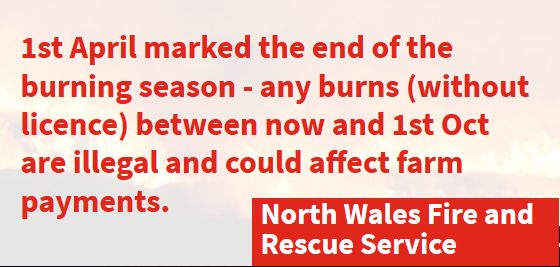
After weeks of dry weather and as we head to what looks to be one of the UK's driest April’s on record, wildfires have once again become a worrying issue. These are annual events but in 2020 the fire service have another major concern, COVID19.
“Dealing with wildfires unnecessarily draws our resources away from where they are needed most, protecting our community…it is important that the public work with us to not add any additional pressure on the emergency services during this time.” Michael Graham NI FRS
With members off work ill or self-isolating there has also been an extension of role for the Fire and Rescue Teams. After a new agreement was made, they have started new tasks which assist NHS colleagues. Authorised to drive ambulances to deliver medicines, retrieval of bodies, antigen testing and training new ambulance drivers. Tasks such as home fire safety checks have been put on hold for now and there is less traffic on the roads, even though some drivers have been recklessly speeding on the quieter streets.
The emergency services are working in a strained environment anyway as part of the ongoing pandemic response. They do not need any diversions.
In Northern Ireland. DAERA and the NI Fire & Rescue Service (NIFRS) are asking farmers and the public for their help during the current spell of dry weather:
“The hot and dry weather has left the countryside vulnerable to fires caused by burning of vegetation or waste and littering and dumping of waste materials could put our emergency services under more pressure. Wildfires are rarely natural. They are almost always started either deliberately, or by reckless burning or disposal of flammable vegetation or waste material. Waste or litter might also contain glass, which can easily start a fire on a sunny day.”
With high pressure nearby there has been weeks of dry, warmer weather but with brisk winds. At this time of year, there are dead grasses and shrubs, such as heather and gorse in abundance.

In Wales, wildfires “have caused serious damage to land, untold damage to wildlife and created an unnecessary drain on our emergency services “
The Scottish Fire and Rescue Service Area Commander said: “There is very little moisture on the ground just now and an abundance of dead material, and this fuel has dried out quickly with higher temperatures and lower humidity levels. This creates a worrying melting pot of dry material mixed with oxygen in the air – all that’s missing is the ignition. There may be less people in the countryside, but even something such a hot exhaust or a discarded cigarette can ignite long, dry grass, and this can quickly escalate to extreme wildfires.”
With the Stay at Home directive, there are fewer people out and about. This might reduce the likelihood of dropped litter or cigarettes but it also means there could be undisturbed opportunities for deliberate lighting of fires in isolated areas. The response from the public to spot fires has been quick but with the dry conditions and brisk winds mean that fires are catching rapidly. Like last summer, people should not be discarding any cigarettes, matches or glass bottles.
“North Yorkshire Fire and Rescue Service has recently reported that despite social distancing measures they have still been called out to a number of deliberate fires in North Yorkshire over the last few weeks. There is also an increased risk of accidental fires from things like discarded cigarettes due to the current dry spell.”
The National Park Authority reminded people about the UK government guidance to avoid all nonessential travel into or around the National Park. There should be no lighting of fires or BBQs. "The annual moorland burning season is over so any moorland fire is a wildfire and should be reported to the emergency services immediately."
With wildfires comes smoke pollution. Under the settled conditions of the High pressure there have been moderate levels of fine particulates and of Ozone. Adding into this smoke particles could cause more strain for those with respiratory issues, so not only the drain on the Fire and Rescue responders but those staying at home.
The forecast shows slight changes from the wholly dry blustery picture but not much rain in the next week. There will be more cloud and a scattering of showers, some heavy even thunder by the start of next week but it's not a good soaking. Maybe for the end of this month, there could be some decent frontal rain as we lose the warm sunshine.
Loading recent activity...